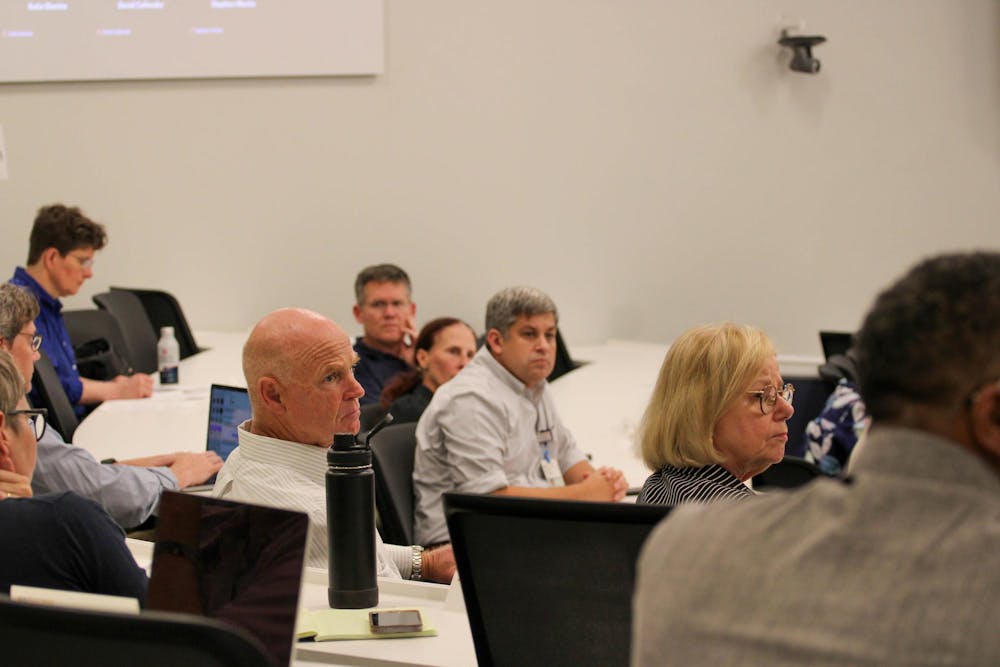University faculty have voiced concerns that the Department of Education’s “Compact for Academic Excellence in Higher Education” threatens the University’s core value of academic freedom. Specifically, several faculty have expressed fear of the federal government’s overreach into a state institution and claim that signing the Compact would be detrimental to the University and future generations of scholars to come.
Interim President Paul G. Mahoney received the offer from the Department of Education Oct. 1 with a deadline of Oct. 20 to submit “limited, targeted” feedback. The Compact proposes principles such as freezing tuition, promoting a “marketplace of ideas,” abolishing institutional units which “punish, belittle and even spark violence against” conservative ideas and screening international applicants for support of “American and Western values.” In exchange for adhering to these principles, the University would receive preferential access to federal funding.
Beyond specific worries about the Compact’s language, several faculty have expressed concern over the idea of the Compact itself. Many have claimed that it demonstrates extreme federal overreach from the Trump administration. MC Forelle, the chair of the faculty committee of United Campus Workers of Virginia’s University chapter and assistant Engineering professor, said that beyond the language within it, the idea of the Compact itself is worrisome.
“The fact that the compact even exists is a concern, because it is a demonstration that the federal government and the Trump administration will not rest until they have control over the way the University functions,” Forelle said.
In a statement to The Cavalier Daily, English Prof. Susan Fraiman further emphasized this concern over the exercise of federal power in a state institution.
“Many of us are wondering how we could do our jobs if the government subjects our teaching and research to an ideological litmus test,” Fraiman wrote. “For the Interim President and [the Board] to accept any part of the Compact is to risk the future of the University as we know it.”
Fraiman further wrote that agreeing to the Compact would mean the University ceding its freedom of speech.
Mahoney has created a working group to advise him on the University’s response to the letter. The working group is under the leadership of Brie Gertler, interim executive vice president and provost, and Jennifer Wagner Davis, executive vice president and chief operating officer. University Counsel Cliff Iler is also part of the working group.
Asst. Global Studies Prof. Laura Goldblatt said, however, that there should be nothing to discuss on the issue, given the Compact’s “stunning overreach” by the federal government. Similar to Fraiman, Goldblatt claimed that the Compact threatens the University’s core value of academic freedom.
“A core provision of academic freedom is that faculty and students and staff are able to, in Thomas Jefferson's words, ‘pursue truth wherever it may lead,’” Goldblatt said. “We're not supposed to be afraid of that, and that means that there can't be meddling by outside entities into what you can and can't study.”
Specifically, Goldblatt expressed concern over the section of the Compact titled “Foreign Entanglements,” which proposes more extensive screening of international applicants to the University.
“Federal permission for foreign student visas is intended to further America’s national interest to the extent the selected foreign students exhibit extraordinary talent … and the selected students are introduced to, and supportive of, American and Western values, ultimately increasing global understanding and appreciation for the United States and our way of life,” the Compact reads.
Goldblatt specifically highlighted that the Compact uses antisemitism as an example of a “noxious value” brought to university campuses by international studies. As a Jewish faculty member, Goldblatt says she resonates with the concerns of antisemitism. However, she does not see the root of the problem to be international students.
“I understand the fears around antisemitism, but on this campus, our experience of that has been about homegrown antisemitism, not people coming from elsewhere,” Goldblatt said. “I think this idea that foreigners are … a threat to Jews is inaccurate [and] extremely dangerous.”
Goldblatt also expressed unease about the Compact calling for universities to define “male” and “female” according to a biological understanding, claiming that this provision is another example of a threat to academic freedom.
“The idea that there are only two genders, or that the gender you're assigned at birth is the only true gender, these are all ideas that I think in any good academic institution should be subjected to inquiry,” Goldblatt said. “Sometimes these ideas hold up, and sometimes they don't, but we certainly can't know if we don't start asking questions.”
In her statement, Fraiman similarly expressed concern with the “strictly binary view of ‘male’ and ‘female’” that universities would commit to by signing the contract.
The Faculty Senate passed a resolution at its meeting Friday opposing the Compact, where 60 senators voted in favor of the resolution, two opposed and four abstained.
“The Faculty Senate of the University of Virginia firmly opposes this Compact as written and calls upon Interim President Mahoney and the Board of Visitors to also reject this Compact outright as well as any similar proposal compromising the mission, values and independence of the University,” the resolution reads.
Similarly, the College and Graduate School of Arts and Sciences Faculty expressed opposition to the Compact at an emergency meeting Monday. According to Erin Lambert, Arts and Sciences Faculty secretary, a statement prepared by the Arts and Sciences Committee on Academic Freedom and Professional Ethics was supported by 94 percent of the College and Graduate School faculty.
“We ask that the Interim President, the Rector and Board of Visitors refuse to discuss joining the compact offered by the federal government,” the statement reads. “Contents of the compact include matters of best practices in higher education with which we are always engaged. But the very existence of this compact is a threat to the values of academic freedom to which we are all committed.”
Music Prof. Bonnie Gordon said that signing the Compact would impact not only current University students and faculty, but future generations of scholars to come. Gordon said that she hopes none of the nine universities asked to sign the Compact will do so.
“All of the universities should be simply saying, ‘Not only will we not sign this, we will not consider it,’ because it goes against academic freedom, it goes against the basis of what we do,” Gordon said. “When universities go down, so many other things go with it.”
Similar to Gordon, Forelle, Fraiman and Goldblatt also shared strong hopes that the University does not sign the Compact. Forelle, however, voiced uncertainty over how the University will handle the situation.
“The Board of Visitors has been acting in really opaque ways [and] have been avoiding transparency,” Forelle said. “There's some real concern that we will again, not get the transparency that we need. We will not get the opportunity to participate in shared governance that we need.”
While the University considers the compact, Rector Rachel Sheridan and Mahoney sent an email to the University community Monday saying that Mahoney had formed a working group to advise him on how to respond. They wrote that it would be difficult for the University to agree to parts of the compact, and offered a link to a survey for community members to provide their feedback.
The University has a deadline of Oct. 20 to submit feedback for the Compact. The letter to Mahoney says that the Trump administration is aiming to have a signed agreement by Nov. 21.







